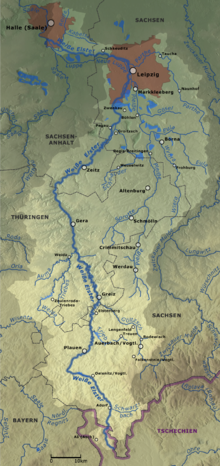White_Elster
White Elster
River in Germany
The White Elster[1][2][3] (German: Weiße Elster, Czech: Bílý Halštrov) is a 257-kilometre (160 mi) long river in central Europe. It is a right tributary of the Saale. The source of the White Elster is in the westernmost part of the Czech Republic, in the territory of Hazlov. After a few kilometres, it flows into eastern Germany where it cuts through the Vogtland in (according to the Encyclopædia Britannica) a "deep and picturesque valley".[4] In Germany it flows through the states of Saxony, Thuringia and Saxony-Anhalt. The White Elster flows through the cities of Plauen, Greiz, Gera, Zeitz, Pegau and Leipzig, and into the river Saale in Halle.
You can help expand this article with text translated from the corresponding article in German. (November 2022) Click [show] for important translation instructions.
|

